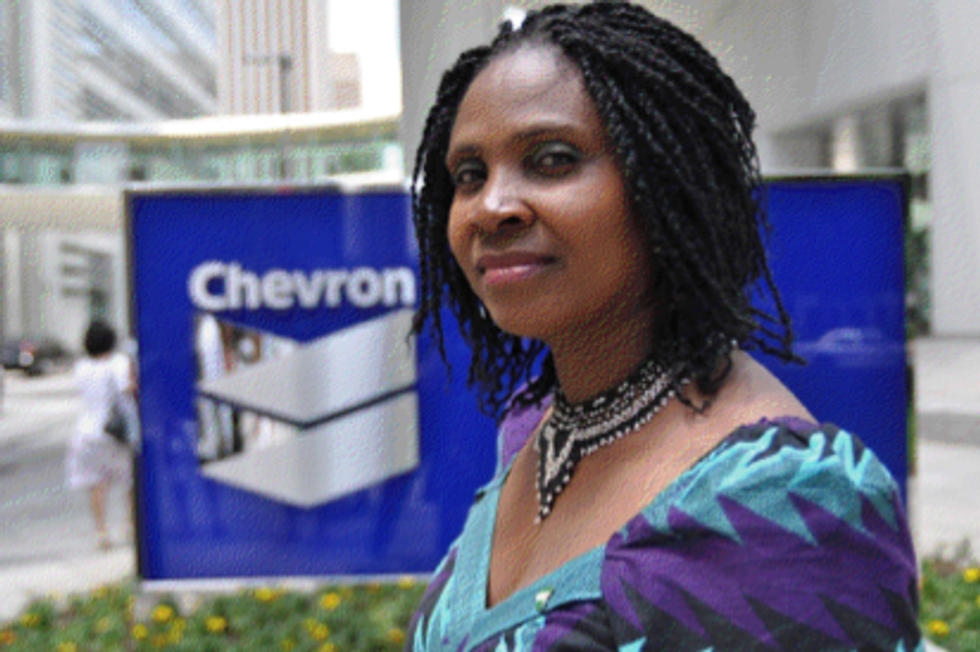Note: The following essay is from a new series sponsored by Other Worlds called, Birthing Justice: Women Creating Economic and Social Alternatives. The series features twelve alternative social and economic models which expand the possibilities for justice, equity, and strong community.
I am a community mobilizer with a passion for mobilizing women for action, for peace, and for their rights. I work with Kebetkache Women Development & Resource Centre in oil-impacted towns and villages - that is, areas where the oil companies are drilling - in the Niger Delta.
Here, we have Shell, we have Chevron, we have Exxon-Mobil, among others. Two problems are the neglect of the region in terms of development, and also the degradation of the environment by the oil companies. There are serious cases of oil spills and gas flaring - horribly toxic for the environment and the people.
The whole fight for resource control has led to the eruption and escalation of all manner of conflict and violence in the Niger Delta. It's all about power and control in light of the oil revenue. In all the dimensions of conflict, the culprit is the oil companies. They play divide and rule so that communities are fighting amongst themselves, and gangs are fighting amongst themselves. The government and its security forces collaborate with the oil companies, and whole communities are disrupted violently by the military. In May 2009, for example, the military invaded some communities in the Delta [displacing up to 20,000 people]. Other massacres have happened before. We also have violence as a result of the activities of gangs of youth and men who politicians bought arms for, with money that's circulating from the oil industry. Most of them are unemployed and the weapons are being used against the [financiers'] enemies.
Women suffer most when violence and conflict erupt as it has in the Niger Delta. A lot of women have died, a lot of women have been raped, and a lot of girl children have had to stop going to school because of the violence. Women are also exposed to strong violence by the culture and traditions which subject them to inhuman and degrading treatment.
Because the society is patriarchal in nature, women haven't been involved in decision-making or governance. But now, women have had to sit up and talk about the human rights abuses and also the violence they're experiencing.
Kebetkache, the women's group I'm with, works with community women in 15 oil-impacted towns and villages in the Niger Delta to build their capacity and facilitate their participation in community affairs and advocacy. We started by mobilizing women for peace marches in the Ogoniland, Emohua, Ogbakiri, and Tereama communities.
After the peace marches, when we saw the women's interests and their desire to act, we started training them in conflict management and peace-building. Then the women went back and did trainings with others in their communities. A whole lot of women got involved. And now, they're going into secondary schools and community youth groups to carry out peace management. Then the youth will set down the training for others.
The women have also been on radio, talking about peace and calling on policy-makers to enjoin the violence in the Niger Delta. We've called on the boys and men in the gangs to drop their weapons of violence, and on the government to do something to reduce violence in the region.
We believe that women, as mothers and wives and lovers, are in a better position to talk to the men who are perpetuating the acts of violence. And we're causing the violence to go down. Since 2007, we've gotten more than 1,600 boys and young men to surrender their weapons to the police and to make the decision not to be involved in violence. A lot of them have withdrawn from gangs and are no longer part of them. We're trying to negotiate with the police so they don't arrest those who turn in their weapons. We're calling for a general amnesty for the gang members, for the government to rehabilitate the youth and reintegrate them back into the society.
If there's a solution at this moment between the oil companies and the government - because they are collaborators - the women will still not benefit because they don't participate in decision-making. There is a need to integrate gender into all levels of power to enable women to participate and become full beneficiaries of the oil revenue. That's why we're advocating for women to be part of government and part of whatever bodies are set up to address the issues of the Niger Delta. More and more, women are getting involved in this campaign for increased women's participation. We're doing a lot to challenge patriarchal programs, to educate community leadership on the need for women's decision-making.
We're confronting domestic violence, too. We've been trying to outlaw it, like has already happened in some other states. With other gender-sensitive laws, like those prohibiting female genital mutilation and widowhood practices, we've made copies of the laws and given them to traditional rulers from communities.
The future depends on whether women can change the story of the Niger Delta and bring about peace. We believe it has to happen. We women will not relent until this happens.

